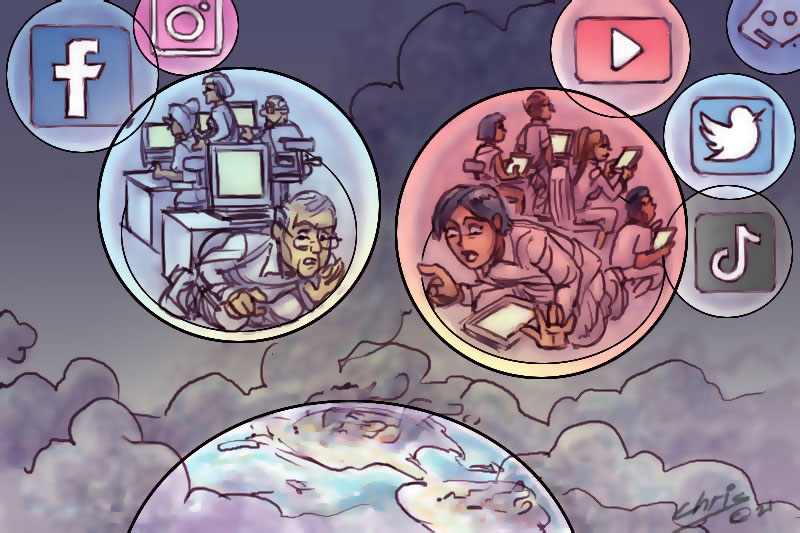Through necessity, the pandemic forced us to inhabit spaces online. We carved out territory for ourselves jumping between curated newsfeeds on various platforms to stay on top of the latest in climate news, political unrest, and developments in vaccines. We used Twitter for fast news and gossip, Instagram for social branding and Facebook for messaging, marketplace and news curation.

Not only are different platforms favoured for different purposes, but platforms are sequestered by generation. Facebook has developed a reputation for attracting an older demographic of users, platforms like Instagram, YouTube and Twitter attract a Millennial base, whilst platforms like TikTok and Discord appeal to a Gen Z audience.
As Ezra Klein points out, political polarisation between generations pre-dates the internet era. Generations have historically operated in separate spaces, consuming, and interacting with the news differently. But social media has arguably deepened generational silos and echo chambers, altering our perception of world issues and most frighteningly of each other.
The pandemic proved to be an interesting case study of how different generations receive their news. A global study by the University of Melbourne and the World Health Organisation (WHO) on Gen Z and Millennial use of media to understand COVID-19 found that Gen Z and Millennial audiences relied on social media for news during the pandemic. And recent research from UTS finds that two thirds of teenagers use social media to receive their news, with Instagram — owned by Facebook — ranking high.
Yet Instagram was never intended to be a news platform, with algorithms favouring posts by users with high numbers of followers, rather than journalistic integrity. Users will tend to curate their feeds, exposing them to users with similar views and creating echo chambers. Add to this a lack of political content on Instagram reels, which has been intentionally filtered out by algorithms, is also cause for concern given the platform’s popularity amongst younger demographics. Those relying on Instagram as a viable news source likely miss out on diverse political and cultural content reinforcing polarisation and cultural rifts.
The trend of using Instagram as a news source is further troubling considering Frances Haugen’s Facebook Papers, revealing how Instagram continues to negatively affect millions of young users. The trove of damaging papers leaked by the whistle-blower revealed that both Facebook and Instagram platform were aware of the harms caused to younger audiences, with excessive use linked to depression and anxiety amongst users. In not acting on this data, Haugen accused the company of putting profits over public safety.
'Though social media has the capacity to close information and generational gaps, it has most likely done the opposite.'
If there’s a silver lining to Haugen’s revelations it might be this: young people are increasingly avoiding traditional social media platforms. Facebook has long been declining in favour amongst younger users, with the latest generation of tech ‘taste-makers’ bypassing larger social media platforms altogether in favour of pseudo-anonymous platforms like Discord and Twitch — traditionally associated with online gaming — to connect while avoiding the negative health effects of more established platforms like Facebook, Twitter and Instagram. And it’s no wonder, given that the experience of young people on older platforms is crowded with misinformation, advertising, superficial macro-influencers and algorithmic homophily.
The problem is that, alongside the lack of research around long-term effects of using newer trendy Gen Z tech platforms like Discord and Twitch, their gamified nature doesn’t leave much room for news content. It’s unclear whether this means that younger generations will ultimately consume less news media, or limit their intake to sub-cultures and specialised areas. Whichever the case, may be, it’s unlikely the result will be a breaking down of silos.
Though social media has the capacity to close information and generational gaps, it has most likely done the opposite. Different age demographics are already living in completely different online worlds, the implications of which may lead to polarisation, social disconnection and political disengagement. The trend of continuing divergence in platform and content is unlikely to build any bridges between worldviews.
Compounding the issue is that, according to an ABC report on young people and news engagement, young people report feeling unrepresented in the news. Already studies noted declines in levels of political engagement among younger Australians. Where the political engagement of young people is already low, a further disengagement from news content could exacerbate this decline, with unpredictable flow-on effects for years to come.
What all this points to is a perfect storm of factors that may lead to wide levels of political disengagement and declines in civic participation among young people.
Ultimately, to encourage young people back to platforms where they are exposed to news content, change will need to come from social media companies and the way they deploy their algorithms which dictate what we view and when. Though we’ve known for some time that machine-learning algorithms and advertising-driven digital media only exacerbates polarisation, there’s no consensus on how this might best be changed. The influence of profit-driven tech giants will mean an uphill battle to regulate the algorithms that steer audiences towards harmful and false news content.
There isn’t much we can do as individuals apart from educate ourselves and be a little kinder and more deliberate in fostering healthy interactions across the political spectrum online. Technology ethicist Tristan Harris points out that self-awareness is key to navigating social media. An understanding that social media platforms use us just as much as we use them may help us to be more thoughtful.
Despite my cynicism — I am a Millennial after all — I still have confidence that if we continue to engage with each other whenever there’s platform overlap, there is hope for constructive communication between generational lines leading to greater civic and political engagement. Or maybe I’ll just stick to TikTok.
Nina Culley is a Naarm-based writer with experience in publishing and editing. Currently she manages and teaches at Melbourne Young Writers' Studio.
Main image: Illustration by Chris Johnson.